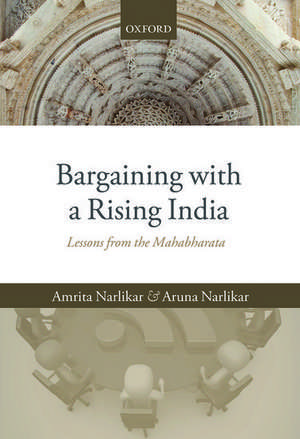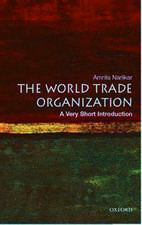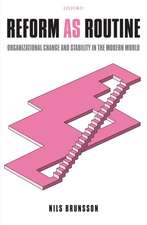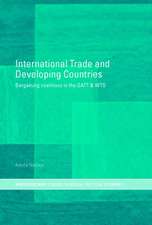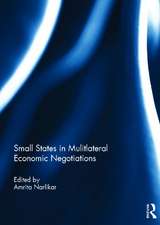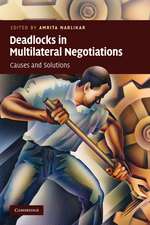Bargaining with a Rising India: Lessons from the Mahabharata
Autor Amrita Narlikar, Aruna Narlikaren Limba Engleză Hardback – 20 mar 2014
Preț: 451.20 lei
Preț vechi: 587.98 lei
-23% Nou
Puncte Express: 677
Preț estimativ în valută:
86.33€ • 90.14$ • 71.45£
86.33€ • 90.14$ • 71.45£
Carte tipărită la comandă
Livrare economică 24-31 martie
Preluare comenzi: 021 569.72.76
Specificații
ISBN-13: 9780199698387
ISBN-10: 0199698384
Pagini: 248
Dimensiuni: 162 x 241 x 21 mm
Greutate: 0.59 kg
Editura: OUP OXFORD
Colecția OUP Oxford
Locul publicării:Oxford, United Kingdom
ISBN-10: 0199698384
Pagini: 248
Dimensiuni: 162 x 241 x 21 mm
Greutate: 0.59 kg
Editura: OUP OXFORD
Colecția OUP Oxford
Locul publicării:Oxford, United Kingdom
Recenzii
All of us outside India need better understandings of its policies and their drivers. This rare, creative book helps by viewing the classical Sanskrit epic partly through lenses from recent negotiation analysis. A corrective to western-centric scholarship, the book makes a remarkably original contribution to the tradition that traces negotiation behavior to national cultures. The authors lessons are relevant for todays international negotiations.
National cultures and international bargaining behavior are too often linked using stereotypes and anecdotes. Narlikar and Narlikar offer for the first time a comprehensive and convincing view of the traditional negotiating culture of one rising power, India, and the effects of that culture on contemporary international negotiations
This study fills a major gap both for scholars and for policymakers by placing Indian diplomacy in a cultural context and provides a new understanding of how Indias classical traditions continue to influence Indias bargaining positions and negotiating strategies.
The book should be of considerable interest to India watchers around the world looking for clues to how a rising India behaves in global negotiations on trade, climate change and reform of international institutions.
I am certain international negotiators and scholars will find this book a rich resource. As the authors' conclude, successful negotiation with the emerging BRIC powers requires "more studies of the cultures of the non-Western rising powers will have to become essential reading for all those involved in the theory and practice of diplomacy and global governance" (p. 223). This is just such a work.
National cultures and international bargaining behavior are too often linked using stereotypes and anecdotes. Narlikar and Narlikar offer for the first time a comprehensive and convincing view of the traditional negotiating culture of one rising power, India, and the effects of that culture on contemporary international negotiations
This study fills a major gap both for scholars and for policymakers by placing Indian diplomacy in a cultural context and provides a new understanding of how Indias classical traditions continue to influence Indias bargaining positions and negotiating strategies.
The book should be of considerable interest to India watchers around the world looking for clues to how a rising India behaves in global negotiations on trade, climate change and reform of international institutions.
I am certain international negotiators and scholars will find this book a rich resource. As the authors' conclude, successful negotiation with the emerging BRIC powers requires "more studies of the cultures of the non-Western rising powers will have to become essential reading for all those involved in the theory and practice of diplomacy and global governance" (p. 223). This is just such a work.
Notă biografică
Dr Amrita Narlikar is Reader in International Political Economy at the Department of Politics and International Studies, and Director of the Centre for Rising Powers, University of Cambridge. She is also an Official Fellow of Darwin College, Cambridge. Her most recent works include a single-authored book, New Powers: How to Become One and How to Manage Them, London: Hurst and New York: Oxford University Press, 2010, and (co-edited with Martin Daunton and Robert Stern) The Oxford Handbook on the World Trade Organization, Oxford: Oxford University Press, 2012. She recently guest-edited a special issue of the Chatham House journal International Affairs on Negotiating the Rise of New Powers, 89: 2, May 2013. Dr Aruna Narlikar holds a doctoral degree in Indian Writing in English and has cultivated a long-standing expertise in Sanskrit, particularly the Mahabharata. She has worked as a columnist and freelance journalist in the top Indian broadsheets in English, including The Times of India and The Hindustan Times, and also writes frequently for the vernacular press in Marathi. She has experience of over ten years in anchoring programs on Indian culture on national Indian television and has also translated books for the National Indian Academy for Literature (Sahitya Akademi).
